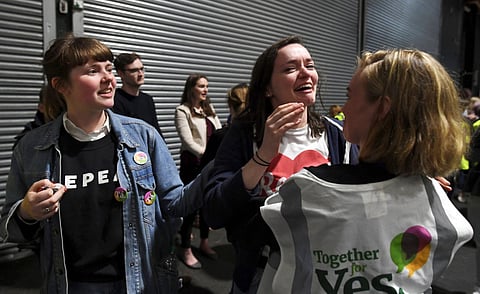Ireland votes for abortion reforms
Constitutional prohibition on termination is swept aside by some 70 per cent of voters

CORK, IRELAND: Ireland is set to repeal its long-standing prohibition on abortion as results from a referendum on the divisive issued showed almost 70 per cent supporting liberalisation.
While the full results won’t be known officially until later Saturday, initial returns showed a landslide in favour of reform.
An estimated 2.5 million voters cast ballots in a referendum on the Eighth Amendment, introduced in 1983, which guaranteed the right to life of both the unborn child and mothers. A No vote would have left the prohibition in place. A Yes win means that the way is now clear for the government to introduce legislation to allow abortion in the first 12 weeks of gestation.
Health Minister Simon Harris indicated Saturday mid-morning that he would be moving forward legislation on abortion and he hoped to introduce it in early autumn.
“Before today’s vote we were telling women in crisis pregnancies to take a boat or take a flight [to Britain where abortion is legal,” he said. “Today we’re saying take our hand.”
But there were fears that some members of the Irish parliament might try to filibuster the legislation to delay its implementation.
“Our bosses — the people of Ireland — have told us to get on with this legislation,” Harris said. “And that’s what we intend to do.”
From the time ballot boxes were opened across Ireland’s 40 electoral districts, the result was never in doubt.
In East Cork, early returns from 15 per cent of the boxes opened showed Yes at 64 per cent, and No at 36 per cent.
That’s a trend that was reflected across the nation, and tallies showed support generally for dropping the Eighth Amendment coming in at the 70 to 30 per cent levels.
The tallies also showed a general alignment between urban and rural areas. Generally, in larger towns and cities, the Yes side registered support of 75 per cent and above. In rural areas, their support fell to around 60 per cent. In Cavan-Monaghan, a rural area adjoining the border with Northern Ireland, voters sided with Yes by 55 to 45 per cent. In Dublin Central, Yes voters outnumbered No by 76.1 to 23.9 per cent.
“There isn’t a Dublin against the rest, an urban against rural spilt,” Deputy Prime Minister Simon Coveney said at Cork City Hall. “All of the people of Ireland have voted and said the law has to change.”
He said that the issue was highly emotive and that he himself had been torn on it, believing that he was in the pro-life camp with government having an obligation to protect the rights of the unborn. However, he said, listening to women’s stories, about how that had to illegally obtain abortion pills on the internet, googling information on abortion at night in their bedroom, or have to travel to England in extremely difficult circumstances, made his change his mind.
“This is a huge step forward for Ireland,” he said. “This has been a two-year discussion.”
In Roscommon, the only constituency to reject equality of marriage in a referendum three years ago, was leaning Yes by 56 to 44 per cent.
Speaking to reporters in Dublin at a ballot-counting centre, Dr Peter Boylan, chair of the Institute of Obstetricians and Gynaecologists said the referendum was a watershed moment for Irish women and it send a message of support to the 170,000 women who had travelled to Britain since 1983 to terminate pregnancies.
“This is about the women of Ireland and the couples of Ireland,” he said.
Catherine Connelly, a member of parliament for Galway West, said the case of Savita Halappanavarresonated with all women in her constituency. The 31-year-old Indian-born dentistwas admitted to hospital in Galway in October 2012 in severe pain and bleeding 17 weeks into a pregnancy. She died a week later from septic shock and massive organ failure after doctors refused to terminate her troubled pregnancy as they detected a foetal heartbeat.
Anne Rabbitte, the spokeswoman on Children and Youth Affairs for opposition party Fianna Fail and who had opposed dropping the Eighth Amendment, said that “democracy has ruled” and parliament should move forward with the legislation.
In Wexford, the county was heading to 68-32 per cent for Yes, and in Clare, it was 60-40 per cent support for Yes.



